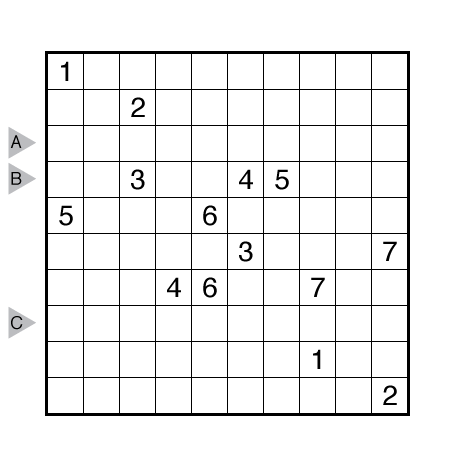Numberlink by Murat Can Tonta

or solve online (using our beta test of Penpa-Edit tools in linex mode where left click+drag draws lines and right click marks X’s)
Theme: Clue Symmetry and Logic
Author/Opus: This is the 106th puzzle from our contributing puzzlemaster Murat Can Tonta.
Rules: Connect each pair of identical numbers with a path passing through edge-adjacent cells. No cell may be used on more than one path.
Answer String: Enter the length in cells of the horizontal line segments from left to right in the marked rows, starting at the top. Separate each row’s entry with a comma.
Time Standards (highlight to view): Grandmaster = 0:25, Master = 0:45, Expert = 1:30
Solution: PDF
Note: Follow this link for other Loop/Path puzzles.

Why do I suck at Numberlink? Not THIS one specifically, but in general? No other puzzle types give me as much difficulty as this one does, and solutions feel more intuition based than logic based.
The classic discussion of how to approach numberlink was written by Palmer Mebane on his blog some years ago. Do a quick Google for Mellow Melon Numberlink Primer and you’ll see it. It should be noted that his comments about solving Nikoli numberlinks do mention that every square will be used. This is not true for puzzles on this site, but it’s still nearly true, and doesn’t throw off the logic much. It’s definitely true that numberlink is more intuitive than rigorously logical, but there’s a knack that can be acquired — a way of seeing the puzzle.
Numberlinks are by far my least favourite puzzle type on Nikoli, for exactly the reason Scott states – requiring intuition more often than pure logic.
I typically avoid reading strategy/tips articles (preferring to learn on my own) but long ago gave up on my self-learned Numberlink abilities and read what I now realize is Palmer’s article.
That “corner logic” section is what I depended on to get this puzzle started, and it was a fairly smooth solve thereafter.
I should add that it feels a bit dirty to use a uniqueness requirement as a tool in a solve, which the corner logic approach depends on…
Frankly, I love intuition-based puzzles like these. It’s a nice change of pace from pure deductive logic.